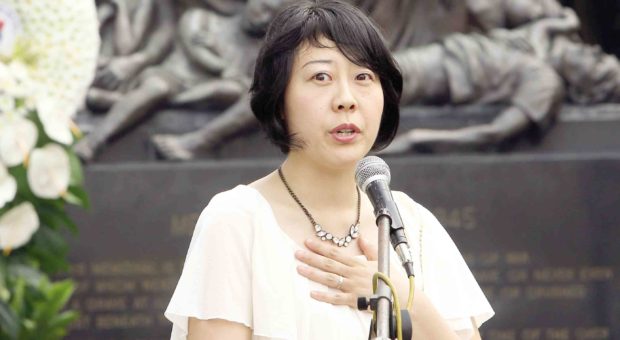World War II long over, but Japanese group still on healing mission
Naoko Jin’s memory of her first interaction with a Filipino almost two decades ago was not a pleasant one.
Jin and several fellow Japanese students were in the country for a study tour in 2000, when she encountered a woman seething with anger, almost to the point of tears.
“Why did you come here? I don’t want to see any Japanese. Why did you return?” the woman snarled.
Jin later learned that during World War II, the woman’s husband was taken away by invading Japanese soldiers who had accused him of being a spy. She never saw him again.
At the time still “really ignorant” of the atrocities committed by the Japanese Imperial Army, Jin was at a loss for words.
“All I could do was brush away my tears,” she recalled.
Death bed confession
When she returned to Japan, a monk told her about a Japanese WWII veteran who, in his death bed, confessed and sought forgiveness for his wartime acts of cruelty.
Jin then realized that “I could not sit around any longer (and) must do something as a member of the postwar generation to reconnect with the old wounds and deep sorrow of those affected by the war.”
In 2004, Jin single-handedly set up Bridge for Peace (BFP), a video message project to convey the apologies of former members of the Imperial Army to Filipino war victims.
Today, the initiative has grown into a nonprofit organization with around 150 Japanese members mostly in their 20s and 30s and including a number of elders.
They go back and forth to record and present the video testimonials and “bridge the gaping chasm in communication” between Japanese and Filipinos after the war ended more than 75 years ago.
BFP also reaches out to Japan’s other war victims in Asia, particularly in China and the Korean peninsula.
Apology for massacre
On Feb. 10, Jin and six other BFP members were back in the country for the commemoration of the infamous Manila Massacre, where an estimated 100,000 civilians were killed by the Japanese military in an orgy of violence from February to March 1945 during the battle to liberate the capital city.
Documented accounts tell of babies and children bayoneted and women raped before being killed by Japanese soldiers, who made their last stand under heavy American bombardment that reduced the city to rubble.
Memorare Manila 1945 Foundation, a group composed of Battle of Manila survivors and victims’ descendants, leads the annual memorial “so that Filipinos will not forget and not allow something like this to happen again,” said its president, Jose Miguel Cabarrus.
Speaking at the program held at the Memorare monument in Intramuros, Cabarrus noted that the “brutal and barbaric” Japanese attacks on civilians were “done with forethought and impunity” and yet “the Japanese government has never formally acknowledged or apologized for the actions of its military in Manila in its three-year occupation.”
“Many of our members would like to see a formal apology from Japan. Hopefully it will come soon,” Cabarrus said. “For without repentance, there will be no reconciliation, and that circle must be closed.”
Until that happens, BFP is the one sending the message across. “We, as the descendants of the Japanese soldiers who invaded your country, would like to apologize for what our forefathers had done,” Jin said during the rites.
“We believe that accepting the past and listening to the words of the people who experienced the horrors of the war will ensure that this mistake will not happen again,” she added.
‘Unforgettable Voices’
In October 2005, the BFP was introduced to Chito Generoso whose grandfather, Jose, was among the around 100 Filipino soldiers massacred by Japanese troops in Bauan, Batagas, in February 1945.
That meeting led seven years later to a BFP-published booklet titled “Unforgettable Voices,” which gathers the accounts of Filipinos and Japanese soldiers during WWII.
To obtain material in her home country, Jin sent out letters to Japanese soldiers from the occupying force in the Philippines, finding their names by poring over war documents in the National Diet Library. Out of the 400 letters sent, half were returned because the veterans had either changed addresses or already died.
The few who agreed to be interviewed for the publication were already in their 80s or 90s —and were initially hesitant to talk, expecting no forgiveness for what they did.
In the booklet, Jin said: “I could sense that they had been carrying the guilt for what they had done decades ago and secretly repenting in their own hearts all this time.”
‘Like a demon’
One veteran eventually confided: “Looking back now, I was like a demon…. The division commander told us that we needed to capture all the Filipinos because they are guerrillas, to kill anybody suspicious.”
Another said he could not talk about the war without getting drunk first. “Do I deserve to be alive?” he asked.
A third comrade confessed to “burgling, raping, murdering and setting everything on fire… I am extremely sorry for what I did. I’ve attended memorial services for my fallen comrades but I didn’t know any ways to make an apology to the people of the Philippines.”
Through Jin and BFP’s efforts, Filipinos are being made aware of such acts of personal purging and repentance from former war aggressors — perhaps more heartfelt and alleviating than official, government acts of contrition.















